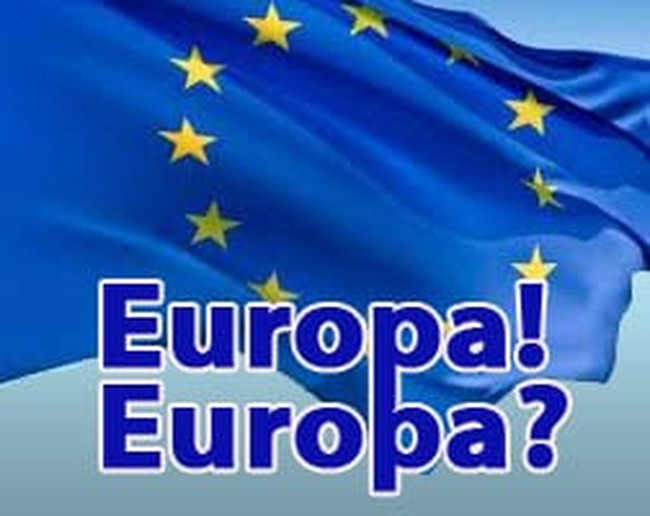 By taking Spain into a war with Libya, Socialist Prime Minister José Luis Rodríguez Zapatero was calculating that he could defy fate by diverting media headlines away from the fact that he has also led Spain to the brink of economic catastrophe. But like the haughty Babylonian King Belshazzar, drunk on the wine of narcissism, a dazed Zapatero has been forced to read the writing on the wall: He has been weighed on the scales and found wanting.
By taking Spain into a war with Libya, Socialist Prime Minister José Luis Rodríguez Zapatero was calculating that he could defy fate by diverting media headlines away from the fact that he has also led Spain to the brink of economic catastrophe. But like the haughty Babylonian King Belshazzar, drunk on the wine of narcissism, a dazed Zapatero has been forced to read the writing on the wall: He has been weighed on the scales and found wanting.
After a recent opinion poll showed that more than 80 percent of Spanish voters have lost their trust in Zapatero, making him Spain’s least popular prime minister since the end of the dictatorship of Francisco Franco in 1975, Zapatero announced on April 2 that he will not be seeking a third term in the 2012 elections. “I thought it would be best for the country,” he said.
The irony is that while many Spanish voters will be breathing a sigh of relief, Zapatero’s exit is likely to create even more problems for Spain than it resolves. Spain is hopelessly mired in the worst economic recession in its modern history, and Zapatero’s withdrawal from 2012 race has opened a power struggle within the Socialist Party. Analysts fear that any power vacuum may spook the markets and endanger Spain’s fiscal future by increasing its borrowing costs.
The political uncertainty in Spain comes as Moody’s Investors Service downgraded Spain’s sovereign debt rating by one notch on March 10 and warned of further cuts to come as it expects bank restructuring will cost far more than what the government expects. Moody’s says Spain may need up to €120 billion ($165 billion) to recapitalize its failing banks, even though the Spanish government and central bank insist they need no more than €20 billion ($30 billion).
At the same time, Spain announced on March 2 that its jobless rate surged to a 15-year record to above 20 percent at the end of February, the highest level in the industrialized world. The jobless rate among the young in Spain has soared to well above 40 percent, a figure that exceeds youth unemployment rates in Egypt and Tunisia. Overall, more than 4.7 million Spaniards are now out of work, and unemployment benefits constitute the largest single component of government expenditures.
As if that were not enough, the Spanish government on March 7 imposed a series of extraordinary measures to combat an increase in fuel prices caused by popular uprisings in North Africa and the Middle East, major suppliers of crude oil and natural gas to Spain. Among other measures, the government has reduced the speed limit on Spanish highways. Deputy Prime Minister Alfredo Pérez Rubalcaba said “the objective is to lower the growth of our energy bill.”
Meanwhile, the government announced that the Spanish economy contracted by 0.2 percent over the whole of 2010, after falling 3.7 percent in 2009. The economy is expected to stagnate in 2011.
The steady flow of bad news in recent weeks — coupled with the dramatic developments in neighbouring Portugal, where the resignation of Prime Minister José Sócrates has sparked early elections and pushed that country to ask for a bailout — implies that Spain’s economic crisis is far from over. Not only does it cast further doubt on the sustainability of Spain’s debt, it also increases the chances that Spain, like Greece and Ireland, will need to ask for a financial bailout. A bailout of Spain would have major implications for Europe as well as for the United States.
How did Spain end up in such a mess? Spain’s economic meltdown largely stems from the collapse of the country’s housing and construction sectors, which accounted (directly and indirectly) for nearly one quarter of Spanish GDP before a speculative real estate bubble began to burst in 2007. The ensuing spike in unemployment, coupled with a sharp drop in domestic consumption and a steep decline in tax revenues, among myriad other woes, have all combined to leave Spain on the edge of an economic abyss.
But other factors have contributed to Spain’s economic crisis: incompetent politicians, reckless government spending, and voter apathy.
Incompetent Politicians: Economists both inside and outside of Spain had been warning for many years that the country’s construction boom was unsustainable, and that urgent measures needed to be taken to diversify the economy and to make it more competitive.
Instead, Zapatero wasted valuable time and energy denying that there actually was a problem. Spanish Socialists, like many postmodern relativists, believe that all problems are by definition imaginary and can be wished away by avoiding negative thoughts. In an effort to downplay the scale of Spain’s economic troubles, the Socialist government has established a seven-year track record of using an arsenal of postmodern euphemisms to avoid unpleasantries and to create a virtual Spanish reality.
In an interview with the Socialist mouthpiece El País, for example, Zapatero famously asserted that the idea that Spain was actually in trouble was “opinionable” and said that “it all depends upon what we mean by crisis.” He said that those warning about an impending economic crisis were being “unpatriotic” and that such talk was a “fallacy, pure catastrophism.” Zapatero also warned: “Let’s not turn economic forecasting into a fetish.” Think positive, he said: “To be optimistic is something more than a rational act. It is a moral requirement, an act of decency and, if I may say so, elegance.”
After Zapatero was finally badgered into using the word “crisis” in a late-night television interview, when a journalist read him the word’s dictionary definition, his government tried to pin the blame for Spain’s self-inflicted economic woes on a foreign scapegoat. Spain’s industry minister said Spain was facing an “imported problem.” The deputy prime minister blamed Spain’s problems on “radical liberalism,” which in euro-speak means the free market. The labor minister blamed “the neo-conservative thinking preached by U.S. President George W Bush, which has resulted in capitalism without ethical limits.” Zapatero himself blamed “the neo-conservative model based on capitalism without borders nor limits nor ethics.”
In February 2010, Zapatero blamed Spain’s economic crisis on an “Anglo-Saxon” conspiracy and ordered his country’s intelligence agency, the National Intelligence Center (CNI), to investigate whether the Americans and Britons were conspiring to undermine the Spanish economy.
Meanwhile, the agriculture minister advised Spanish consumers to ride out the economic storm by “eating rabbit meat” because at €5 per kilo, it is less expensive than beef, pork, or lamb.
Reckless Government Spending: Up until the austerity measures recently foisted upon Spain by international investors, one of Zapatero’s main diversionary tactics had been to try to shield Spanish voters from exposure to the reality of market economics. In doing so, he has gone on a seven-year spending spree that has left Spain deeply in debt.
Just one example: Zapatero’s 2008 re-election promises totalled €22 billion, or a whopping 2.1 percent of Spain’s GDP. For the 1.7 million Spaniards eligible to vote for the first time, for example, Zapatero promised rent subsidies, and for the under-30s he promised to build 150,000 low-cost homes. In a bid for the female vote, he proposed that working women should pay less tax than men. And for low wage earners, he promised to exempt them from paying income tax altogether.
Zapatero also promised to raise pensions and the minimum wage, to create 300,000 new child care slots, to increase autonomy for the region of Catalonia, to financially compensate companies that adapt their working hours to those of schools, and to provide new fathers with one month of paternity leave.
In an effort to reverse Spain’s demographic crisis, Zapatero launched the so-called “cheque bebé,” a government scheme to bribe Spanish parents into having children by paying them €2,500 ($3,500) for every newborn baby. As a sop to the environmentalist greens, Zapatero also promised to plant 45 million new trees (at one for each Spaniard, the Socialists will have to plant 30,821.9 trees every single day for the next four years). Another €3.5 billion would go towards the postmodern-sounding “Liberty, Coexistence and Rights in a Globalized World.”
Facing heavy pressure from investors and other European countries to reduce its spiralling deficit, Zapatero recently raised taxes and cut benefits, essentially ending his Socialist “progressive” revolution. Suddenly face-to-face with the reality of market economics, Spanish voters are none too happy about it.
Voter Apathy: Having grown accustomed to decades of cradle-to-grave socialist largesse, Spanish voter apathy (not to mention cultural idiosyncrasies) has greatly contributed to the country’s demise.
Consider a phenomenon known as the “Post-Vacation Syndrome” (síndrome posvacacional), an ailment that says much about the Spanish work ethic. Every September millions of unfortunate Spaniards, having just enjoyed four full weeks of paid summer holidays, confront the unbearable trauma of heading back to work. And as happens every year around this time, an armada of psychologists, psychiatrists, and sundry other mental health specialists — many of whom are on the state payroll — offer their services to Spaniards who just cannot adjust to the reality of work.
According to Cinco Dias, one of Spain’s leading business newspapers, Post-Vacation Syndrome “is manifested in the form of apathy, generalized weakness, lack of motivation, sadness, anxiety, loss of appetite and concentration, changes in character with irritability, insomnia, and muscle and gastric discomfort.” The national public broadcasting network Radio y Televisión Española suggests that if the ailment lingers, it is “advisable to seek professional help.”
Spain’s main newspaper, the pro-Socialist El País, estimates that up to one-third of Spaniards suffer from the syndrome, although some human resources management companies say that 50 percent is a far more accurate figure.
How should Spaniards mitigate the adverse effects of “the return” to work? The human resources management company Randstad says it is important to return to work without thinking about the eleven months remaining until the next summer.
But are Spaniards really overworked? Spain celebrates 14 public holidays (nine of which are declared by the national government and the rest at the provincial level). If one of the nine national holidays falls on a Sunday, regional governments get to choose a replacement holiday. And if a national holiday falls on a Thursday or on a Tuesday, businesses usually close on Fridays and Mondays in order to make a “bridge” (hacer puente) for an extra-long weekend. Add to these public holidays the 30 days of vacation that are mandated by law and Spaniards get roughly 45 days off per year.
Compare this with the United States, which observes ten federal holidays, and where, according to the Expedia International Vacation Deprivation Survey, Americans receive on average 13 days of vacation.
But Spaniards find other ways of getting extra time off from work. Labor strikes have become a national sport in Spain. According to the Spanish Confederation of Employers’ Organizations (CEOE), Spanish workers hold thousands of strikes each year, which result in the annual loss of some 50 million man-hours of labor.
 With all the time off, the Spanish work week effectively was reduced to 30.1 hours in 2010, according to new data provided by the Spanish statistics agency.
With all the time off, the Spanish work week effectively was reduced to 30.1 hours in 2010, according to new data provided by the Spanish statistics agency.
At the same time, tax evasion is rampant. The shadow economy in Spain is equivalent to 23 percent of GDP, and is growing far faster than the real economy. Overall, Spaniards avoid paying taxes on income of €240 billion annually, which deprives the government of as much as €25 billion a year in tax revenue. (By way of comparison, in the United States, the shadow economy is around 7 percent of GDP.)
No wonder Spain’s social welfare state resembles a giant Ponzi scheme that is fast running out of cash. But former British Prime Minister Margaret Thatcher once said it would be so. In prescient remarks, Thatcher once said: “Socialist governments traditionally do make a financial mess. They always run out of other people’s money.”









Join the conversation as a VIP Member